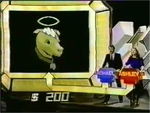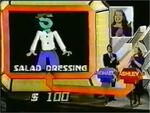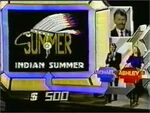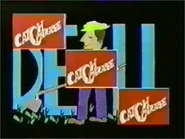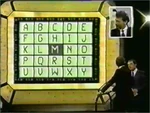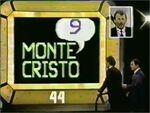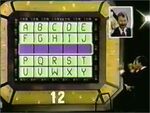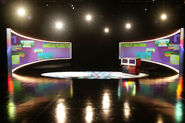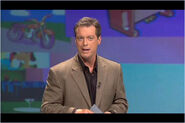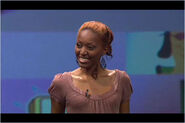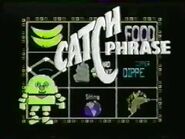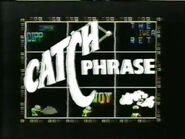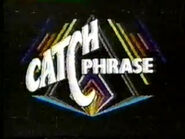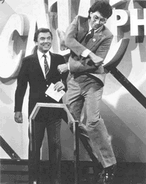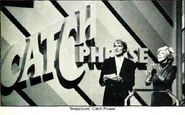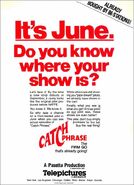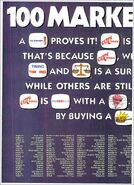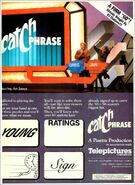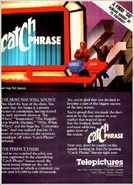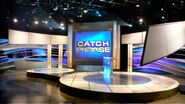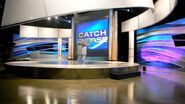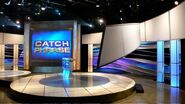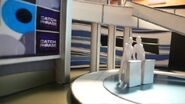| Host | |
| Rick Barry (1985, Pilot) Art James (1985-1986) Todd Newton (2006) | |
| Model | |
| Shana Forman (aka Mary Poms; 1985-1986) | |
| Announcer | |
| John Harlan (1985-1986) | |
| Broadcast | |
| Syndication (Daily): 9/16/1985 - 1/10/1986 Unsold Pilots (All New Catch Phrase): 2/5/2006 | |
| Packager | |
| Marty Pasetta Productions | |
| Co-Packagers | |
| Telepictures (1985-1986) Granada USA (2006) | |
"What is this Catch Phrase? You'll find out the answer to this and many more, as we play television's most exciting new game: "Catch Phrase"! And here's your host on "Catch Phrase", Art James!"
Catch Phrase was a short-lived game show where two contestants attempted to solve computer animated puzzles known as "Catch Phrases" in order to win cash & prizes.
Main Game
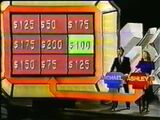
How much will each catch phrase be worth?
Two contestants competed; the returning champion stood at the blue podium, and the challenger stood at the red podium. At the start of each round, one player (the challenger at the start of the game, thereafter the trailing contestant) saw dollar amounts flashing in a randomizer. The contestant's job was to stop the randomizer by hitting his/her button. Whatever the dollar amount landed on became the value for the Toss-Up Catch Phrases. The dollar amounts ranged from $100 to $200 in the first round, $225 to $350 in round two, $375 to $500 in round three and $525 to $700 in round four. At first, the amounts in round one were $50 to $200 with amounts in round two being $225 to $400.
Toss-Up Catch Phrases
On each toss-up, the computer drew a popular catch phrase on the screen. Sometimes a robot named Herbie, the show's mascot appeared in the catch phrase. His appearance and what he does acted as an important word in the answer. When the puzzle was finished or close to being finished, a bell sounded allowing the contestants to buzz-in. Upon buzzing in, a light leading from the buzz-in contestant's podium lit up in the buzz-in contestant's color leading up to the screen frame. A correct answer won the toss-up, but an incorrect answer gave the opponent a free shot, the opponent also got a free guess if the first player buzzed in too early before the bell. The first player to buzz-in with a correct answer added the landed money amount to the bank plus a chance to solve a Super Catch Phrase.
Super Catch Phrase
The Super Catch Phrase was a special Catch Phrase that was hidden behind nine squares with the show's logo on each. On each new turn at the Super Catch Phrase, the nine squares or whatever squares were left flashed in a randomizer just like the money amounts. The player in control hit his/her buzzer to stop the randomizer which will land on a square causing it to be removed from the screen and reveal a piece of the puzzle. Then the contestant had five seconds to think of an answer. A correct solution won all the money in the bank, but incorrect solution or failure to respond caused another Toss-Up Catch Phrase to be played.
Several rounds (usually two or three) were played according to time, and when time ran out in the middle of a round, the rest of the current Super Catch Phrase was revealed and the first player to buzz-in with a correct answer won the money in the bank. Both players got to keep their cash, and the player with the most money when time was called wins the game, became Catch Phrase champion and went on to the bonus round for big prizes. If neither player solved the Super Catch Phrase after all the squares were revealed, the money in bank was carried over into the next round.
Bonus Round
In the bonus game, the winning player faced a game board with 25 squares lettered A to Y. Behind those letters were Catch Phrases, with the most difficult one behind the letter M, the center square. The champion chose a square and tried to solve the hidden Catch Phrase behind it. The player can take as many guesses as he/she can, and a correct answer captured the square. But if the champ is stumped, he/she can pass it and may want to come back to it later. The object of the bonus was to get five squares in a row in 60 seconds or less.
If the contestant can get five in a row in a straight line (across or up & down) he/she won a prize package worth more than $5,000. But if the champ can get five in a row in any direction using the difficult M square, he/she won a $10,000 prize package. If time ran out and no five in a row was completed, the champion still won $200 a captured square with the total doubling if one of them was the M.
Champions stayed on the show until he/she was defeated or won five games in a row. Doing so also won a bonus prize.
International Versions
Despite being a flop here in the US, the show spawned numerous international versions including:
| Country | Local Name | Host | Network | Years Aired |
|---|---|---|---|---|
| Australia | Catch Phrase | John Burgess | Nine Network | 1997-1998 |
| Burgo's Catch Phrase | 1999-2001 2002-2003 | |||
| Greece | Vres ti Frasi Find the Words |
Miltos Makridis (1998-2000) Joyce Evidi (2000-2001) |
Mega Channel | 1998-2001 |
| Indonesia | Tebak Gambar Guess the Picture |
David Chalik | RCTI | 2001-2003 |
| Poland | O co chodzi? What is it? |
Agenieszka Wróblewska | TVN | 2000 |
| United Kingdom | Catchphrase | Roy Walker Nick Weir Mark Curry Stephen Mulhern |
ITV | 1986-1999 2000-2002 2002 2013-present |
| Family Catchphrase | Andrew O'Connor | The Family Channel (now called Challenge TV) | 1994 (only 50 episodes were produced for the short-lived series) | |
| Vietnam | Duoi hinh Bat Chu Finding Words by Looking at Pictures |
Xuan Bac | Hanoi Radio Television | 2006-present |
| Trung Kien Trung Duc |
Thanhhoa Radio Television | 2005-present 2012-present |
2006 Unsold Pilot
Twenty years later, in 2006; Granada USA shot a pilot for a potential revival of the short-lived show with Todd Newton as host. Unfortunately, it didn't sell.
Main Game
The game was played in three rounds.
Rounds 1 & 2
The first two rounds were just like the original version except every Catch Phrase adds cash to the player's total and solving the Super Catch Phrase won bonus cash.
Round 1
Each Catch Phrase was worth up to $400 and solving the Super Catch Phrase won an extra $1,000.
Round 2
Each Catch Phrase was worth up to $800 and solving the Super Catch Phrase won an extra $1,500.
Round 3
Round three was played with nothing but toss-ups (no supers). Prior to each Catch Phrase, the trailing player sets the amount for the upcoming Catch Phrase (up to $1,500). When time was up, the player in the lead was the winner.
In the bonus round, each catchphrase was worth $1,000. Getting 5 in a row won $10,000, but getting 5 in a row using the M won $20,000.
Gallery
More Pictures
Music
Ray & Marc Ellis
Inventor
Stephen Radosh
Rating
Additional Page
Links
Rules for Catch Phrase @ loogslair.net
Brian Moore's Catch Phrase Rules Page (deadlink)
James Vipond's Catch Phrase Page
Josh Rebich's Catch Phrase Rule Sheet
Catch Phrase Pilot Set



